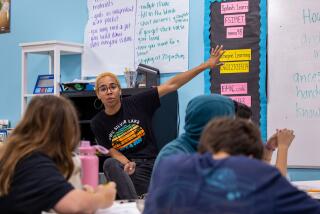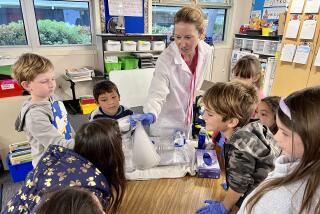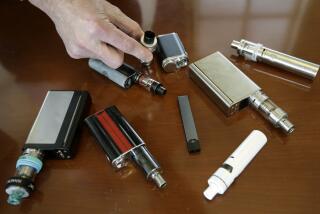ANAHEIM : Pupils Find Ways to Study All 5 Senses
- Share via
Can a string, a paper clip and a plastic foam cup really simulate the sound of a lion roaring? And who can tell the difference between an apple and a potato when both are eaten with eyes closed and nose pinched?
Students at Glenview Elementary School answered those and other questions Friday at the school’s annual Science Day, a morning-long event filled with hands-on science lessons.
With the focus on learning about the five senses, the 700 students took turns touching, tasting, smelling, listening and viewing at different stations set up by teachers, and recorded their observations on charts and graphs.
Kindergarten through third-grade students were matched with students from fourth through sixth grade. The older students, who had already tried each experiment, led their younger charges, helping them to understand the science behind each lesson.
Ten-year-old Devin Cranford was paired with Jason Eady, 8. Their first lesson dealt with the sense of smell and how it affects the sense of taste.
First, Jason sniffed eight cotton balls, each soaked in a different scent. After sniffing each one, Jason announced what the scent was to Devin, who recorded Jason’s guesses.
“I think this one is taffy,” Jason said after smelling a bright pink cotton ball. Other students guessed that the cotton, which was actually saturated with strawberry scent, had been soaked in Pepto-Bismol.
At another station, Julie Kim, 10, helped 9-year-old Heather McGraw learn how sound is created. After tying a piece of string to a paper clip, Julie instructed Heather to pass the string through a hole in the bottom of a plastic foam cup. The cup was then placed in a cut-out of a lion’s head. Heather put the cup up to her ear and Julie pulled her fingernails down the length of the string.
With a small smile on her face, Heather exclaimed, “It really works.”
“It works because as the string vibrates on the cup the sound goes into your ear,” Julie explained to her partner.
Teachers said the hands-on approach is far more effective than reading information in a book. “These experiments will leave an impression a lot longer,” said kindergarten teacher Laurie Smith. “Feeling and doing are far more important than sitting at a desk and reading or hearing about things.”
Fifth-grader Julie Kim agreed, saying the experiments are more meaningful than textbooks and lectures.
“The books are really boring,” Julie said. “Hands-on science has cool experiments. I think we learn more when we actually do it instead of reading about it.”
More to Read
Sign up for Essential California
The most important California stories and recommendations in your inbox every morning.
You may occasionally receive promotional content from the Los Angeles Times.













